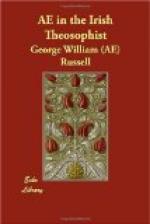The choice here lies between Priest and Hero as ideal, and I say that whatever is not heroic is not Irish, has not been nourished at the true fountain wherefrom our race and isle derive their mystic fame. There is a life behind the veil, another Eri which the bards knew, singing it as the Land of Immortal Youth. It is not hidden from us, though we have hidden ourselves from it, so that it has become only a fading memory in our hearts and a faery fable upon our lips. Yet there are still places in this isle, remote from the crowded cities where men and women eat and drink and wear out their lives and are lost in the lust for gold, where the shy peasant sees the enchanted lights in mountain and woody dell, and hears the faery bells pealing away, away, into that wondrous underland whither, as legends relate, the Danann gods withdrew. These things are not to be heard for the asking; but some, more reverent than the rest, more intuitive, who understand that the pure eyes of a peasant may see the things kings and princes, aye, and priests, have desired to see and have not seen; that for him may have been somewhat lifted the veil which hides from men the starry spheres where the Eternal Beauty abides in the shining—these have heard and have been filled with the hope that, if ever the mystic truths of life could be spoken here, there would be enough of the old Celtic fire remaining to bring back the magic into the isle. That direct relation, that vision, comes fully with spiritual freedom, when men no longer peer through another’s eyes into the mysteries, when they will not endure that the light shall be darkened by transmission, but spirit speaks with spirit, drawing light from the boundless Light alone.
Leaving aside the question of interference with national movements, another charge, one of the weightiest which can be brought against the priestly influence in this island, is that it has hampered the expression of native genius in literature and thought. Now the country is alive with genius, flashing out everywhere, in the conversation even of the lowest; but we cannot point to imaginative work of any importance produced in Ireland which has owed its inspiration to the priestly teaching. The genius of the Gael could not find itself in their doctrines; though above all things mystical it could not pierce its way into the departments of super-nature where their theology pigeon-holes the souls of the damned and the blessed. It knew of the Eri behind the veil which I spoke of, the Tir-na-noge which as a lamp lights up our grassy plains, our haunted hills and valleys. The faery tales have ever lain nearer to the hearts of the people, and whatever there is of worth in song or story has woven into it the imagery handed down from the dim druidic ages. This is more especially true today, when our literature is beginning to manifest preeminent qualities of imagination, not the grey pieties of the cloister, but natural magic, beauty, and heroism. Our poets sing Ossian wandering the land of the immortals; or we read in vivid romance of the giant chivalry of the Ultonians, their untamable manhood, the exploits of Cuculain and the children of Rury, more admirable as types, more noble and inspiring than the hierarchy of little saints who came later on and cursed their memories.




